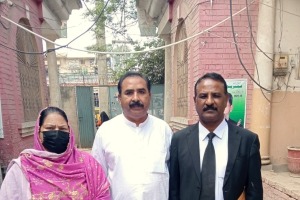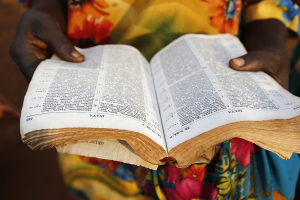Christians Urged to Meet Atheists in the Public Square
Christians shouldn't always turn the other cheek and ignore the attacks of secular thought, says one prominent conservative writer. They need to step out and meet the atheist critique.
"We don't want the public square to be dominated by the atheists," said New York Times bestselling author Dinesh D'Souza.
D'Souza believes Christians have left the public square unoccupied, limiting their expression of religiosity to church on Sunday, their families, and the Christian subculture.
As a consequence, atheists have entered the public square – what Christians thought would have been "neutral space," as D'Souza put it. And they want to drive the Christians out, remove Christian symbolism from coins, the pledge and public buildings.
"Ultimately, they want to discredit Christianity as something that is incompatible with modern life and modern thought," said the noted author in an interview with The Christian Post.
D'Souza is calling Christians back to the public square.
"There is a time to turn the other cheek but there is also a time to drive the money changers out of the temple," he said. "By that I mean there is nothing in Scripture that says Christians should ignore or embrace attacks on their face. But with the right tone, using not only Scripture but reason and science and experience, I think Christians should step out into the world and meet the atheist critique."
D'Souza is due to release What's So Great About Christianity next week. It's his first book, among many, dealing with Christianity in America. He originally set out to approach the topic in a modest and more secular way, he said, but found himself in the midst of a number of atheist books hitting stores and greatly widening the attack on religion and, more specifically, Christianity.
The atheistic arguments – that Christianity goes against reason and science and is based on blind faith – are resonating with people, D'Souza noticed, and hitting bestseller lists.
"I do think that we are seeing a more self-confident and perhaps even militant atheism," he noted. "Atheists are kind of on the war path, out to attack religion, demean it, drive it out of the public square, and remove all religious symbolism from American society. So something odd is going on here."
One such atheist is Richard Dawkins, author of The God Delusion, who is urging atheists to come out of the closet and declare themselves publicly with his Out Campaign. Like other "new atheists," Dawkins publicly rejects the existence of God and wants to drive out religion.
Part of the reason society is seeing an emboldened atheism is that a lot of these outspoken atheists were hoping religion would disappear as society became more modern and developed, according to D'Souza.
"Religion was seen as more of an ancient form of belief that would go away as science progressed and as we all became more successful, educated and affluent," said D'Souza.
"But this has not happened," he continued. "And, in fact, religion is booming in countries around the world," including the most modernized ones such as India and China.
"So the atheist in a way is getting a little more desperate," D'Souza believes.
Living in a culture that is to a considerable degree secular, D'Souza would like to see in churches across the country apologetics come to center stage not to displace what the churches have been doing but to supplement it in a very important way, he said.
"[Christians] are going to meet arguments that cannot be settled simply by 'the Bible says this, the Bible says that' because the other person will promptly reply that they don't accept the authority of the Bible," D'Souza noted.
He suggests Christians become "bilingual" in which they are educated in both the biblical language and a secular language the world can recognize – a language anchored in history and reason and experience.
In his upcoming book release, due out Oct. 16, D'Souza dispels common myths about faith, many of which are argued by atheists.
Myth #1: Atheism is growing and more people are choosing it over church
Pews might be empty in some urban parts of America, but the world is witnessing a huge explosion of Christianity, says D'Souza who notes Christianity as the fastest-growing religion in the world and that the number of unbelievers is actually shrinking. In America, about half of the population goes to church and an overwhelming majority believes in God. But there are also "powerful currents of secularism" in this country that counter that, the author acknowledged.
Myth #2: Religion has caused history's wars, murders, and violence
The number of people killed in religious wars such as the Crusades or the Spanish Inquisition is infinitesimal compared to those killed during modern atheist regimes, the author notes. "We have to keep a sense of proportion," he says.
Dawkins had argued in an earlier debate that atheists never commit atrocities in the name of atheism while religious people do so in the name of their faith.
D'Souza disagrees. "Somebody should send Dawkins a copy of 'The Communist Manifesto' [because] the truth of the matter is that these secular ideologies of the 20th century were explicitly opposed to religion."
"Communism was explicitly atheistic. It committed attacks against the church, imprisoned priests, shut down prayer meetings ... in the name of creating atheist utopia freed from the shackles of traditional religion and traditional morality," said the conservative author.
Myth #3: There is no such thing as a human soul
Atheists use science to argue that there is no soul, as there is no physical evidence of one. "If the atheist universe were true, there would be no free will in it," says D'Souza. The world of science, of atoms and molecules, is one in which there is no free choice because the actions of the atoms and molecules determine the outcome, he argues. Atheists believe the only things that exist are the material things that can be seen under the microscope and smelled and touched to which there is empirical evidence, he adds.
"There are dimensions of reality that cannot be captured in purely material terms. When has science ever located a thought or a feeling or a choice?"
Myth #4: Where is God when bad things happen?
D'Souza turns this question around and asks where is atheism when bad things happen? At the tragic event of the Virginia Tech shooting in April, there were nonstop memorial services and everyone began to speak a very religious language of healing and spirituality, he noted. "Atheism has absolutely nothing to offer us at moments of life that matter the most – birth, marriage, death, suffering."
What's So Great About Christianity is a defense of Christianity, D'Souza explained, "but it's a defense that meets the critics of Christianity by taking them seriously."





























